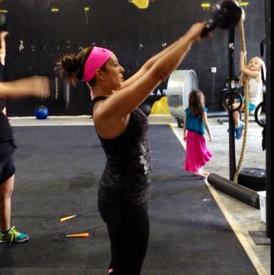Organic

mnishi
Posts: 419 Member
Who's gone organic?
Whos trying to?'
I'm attempting to go almost completely organic (veggies and meat) and stop buying processed foods.
I'm a girl on a budget and never really thought I could afford to go organic; however, I've recently discovered that my wal-mart carries organic, free-range meat and my Food-4-Less (kroger) has an organic produce and dairy section. I'm also going to start an organic veggie garden this spring to help with some of the cost. '
Any advice for newbie?
Whos trying to?'
I'm attempting to go almost completely organic (veggies and meat) and stop buying processed foods.
I'm a girl on a budget and never really thought I could afford to go organic; however, I've recently discovered that my wal-mart carries organic, free-range meat and my Food-4-Less (kroger) has an organic produce and dairy section. I'm also going to start an organic veggie garden this spring to help with some of the cost. '
Any advice for newbie?
0
Replies
-
Organic as a label is pointless. Thanks to the FDA's regulations, the hoops that a farmer has to go through to be allowed to use the word "organic" in their labelling are utterly rediculous. They require so much paperwork very few companies can really afford to do it, because farmers simply don't have the time and resources to spend. For instance, Cabot Cheese is processed with stricter guidelines than is required by FDA "Organic" labelling, but they can't use the label because they're a cooperative, and the small farmers simply don't have the resources to get through all of the paperwork.
Grow your own, or find a local farmer you like. You'd be amazed how willing to talk to you about their growing methods most farmers are.0 -
Thanks, I have heard that it is very difficult to get the USDA Organic label.
There's a website I found, www.illinoisfarmdirect.com, that list all local farms in Illinois, I plan on visiting a few of these soon. If it's grown without pesticides or chemical fertilizers then I consider that organic (or me anyway); however, in the grocery store, it's really too hard to know what been done to my apple unless it does say USDA Organic.0 -
I always wish I could buy 100% organic but I simply cannot afford it.
Then I am slightly dubious that they are in fact any better than the standard versions, as the poster above has mentioned
Hmmm0 -
I don't necessarily buy 100% organic foods, but I primarily shop at a local farmer's market for my produce and meat, so I have a good idea of what I'm getting. I ask questions, read labels, and keep tabs on when they have deliveries so I can get the freshest produce. Surprisingly, I haven't spent any more $$ since shopping this way than I did before. It can be done!
Farmer's markets are awesome 0
0 -
As someone who worked in commercial agriculture in central CA 99-2001, organic is mostly an advertising gimmick. Not that the companies w/ the USDA organic label are lying, but that it's a huge amount of effort that it's mostly done for advertising like reasons. Also, please, please, please remember that organic / natural DO NOT EQUAL safe. I buy CYANIDE to get the critters in the backyard from my ORGANIC gardening catalog. Several of the e-coli outbreaks in recent years are from organic farming. That's because the cheapest nitrogen fertilizer is COW POOP. Cow poop is an effective and safe soil enrichment option when it's handled properly, there's the catch. So go organic if you think you really think you should. but don't be deluded into thinking anything labeled organic is automatically healthy.0
-
As someone who worked in commercial agriculture in central CA 99-2001, organic is mostly an advertising gimmick. Not that the companies w/ the USDA organic label are lying, but that it's a huge amount of effort that it's mostly done for advertising like reasons. Also, please, please, please remember that organic / natural DO NOT EQUAL safe. I buy CYANIDE to get the critters in the backyard from my ORGANIC gardening catalog. Several of the e-coli outbreaks in recent years are from organic farming. That's because the cheapest nitrogen fertilizer is COW POOP. Cow poop is an effective and safe soil enrichment option when it's handled properly, there's the catch. So go organic if you think you really think you should. but don't be deluded into thinking anything labeled organic is automatically healthy.
^^ Agree... just because it has an "organic" label on it doesn't mean it's healthy.
One thing I have learned is that some things are not worth the extra money to buy organic. If you wash them properly the actual food part of the plant is fine without being organic. Things that have thicker skins are what you don't really need to buy organically.
If organic was cheaper I would be buying more of it however with the cost of things a lot of people can't.0 -
I don't buy organic because I think it's "heathier" (ie more nutrients, etc)< but more because I don't want the added chemicals. I specifically try to buy produce and meats/dairy that is organic because I also don't want the added hormones and antibiotics and also HFCS/GMO. When the Farmer's market starts up in my town I shop there weekly for my fresh produce this way I know where it's coming from.
Google "the dirty dozen" which will tell you which foods you're better off having organic.0 -
I've heard a lot of people say that organic isn't necessarily more healthy, but if organic farming isn't pumping toxins into my air and water, I consider that more healthy.
I've heard of E. coli outbreaks in vegetables using cow manure, did you know that cows fed a grass diet are 80% less likely to carry E. coli? Another reason to buy grass-fed beef.
Because I feel like I can't trust food companies or even my government, I will try to grow what I can myself and purchase the rest from local farms. When I can't do either, I will buy organic because I think we need to step as far away from chemicals and hormones as we can.0 -
I have and I feel fantastic!! My goal has been to buy nothing pre-packaged. My mental state has improved, my physical state has improved.0
-
I don't buy organic because I think it's "heathier" (ie more nutrients, etc)< but more because I don't want the added chemicals. I specifically try to buy produce and meats/dairy that is organic because I also don't want the added hormones and antibiotics and also HFCS/GMO. When the Farmer's market starts up in my town I shop there weekly for my fresh produce this way I know where it's coming from.
Google "the dirty dozen" which will tell you which foods you're better off having organic.
Here's the catch with organic. Organic doesn't mean it doesn't contain chemicals, additives, or toxins of any kind, it just means that the chemicals the foods are grown with are certified organic. Organic fruits and vegetables can be treated with just as many nasty pesticides (for example) as non-organic foods, they just happen to be certified organic pesticides (like cyanide that a previous poster mentioned.) It's mostly a marketing gimmick to get people to spend more money.0 -
We purchase everything as local as we can from our farmers. I do a garden and grow my own vegetables and what I don't grow I get from my farmers market. We eat almost no processed food (chemical laden junk) and I urge others to do the same! Make small changes and start there. It's really doesn't cost that much more especially if you start making everything from scratch!0
-
try this site to find local farmer (organic or other) in your area. http://www.localharvest.org/
and I am not bashing organic, but it is not the end all to be all. I eat a mix of precessed food and fresh foods. I;ve lost weight and my doctor tells me that I am "ridiculously healthy". But the site I pointed you to will help you find farm fresh foods in your area.0 -
Organic doesn't mean healthy. Organic means no hormones, no genetic engineering, no sludge, no pesticides...which I agree is a great thing. We feed my son, all organic. However, there are some things that it doesn't really matter if it is organic or not and can save you money. For example, peas. Peas are in a pod and generally removed before eating. But, people honestly believe that if it is organic it must be good for you. WRONG. If you take an organic candy or cakes...yes, there are no hormones or pesticides BUT, there is still sugar. Sugar is sugar and is still processed the same in your body. Here are the top 15 things that you don't necessarily have to buy organic.
1. Onions
2. Sweet Corn
3. Pineapple
4. Avocado Avocado
5. Asparagus
6. Sweet peas
7. Mango
8. Eggplant
9. Cantaloupe (domestic)
10. Kiwi
11. Cabbage
12. Watermelon
13. Sweet Potatoes
14. Grapefruit
15. Mushrooms
I think that before getting all hyped on we must try to be 100% organic shoppers there is a lot more research that needs to be done. Just my opinion!0 -
only thing im really funny about being organic is milk, and soft fruits where you eat the skin.
if an organic item is available and the price difference is negligible i will buy it, simply because it usually looks less like a carbon copy veg/fruit.
whats wrong with wonky carrots?!0 -
I buy some but not a lot of organic foods because they are outrageously expensive where I live. You can buy organic processed foods, but I stear clear of most processed foods in general. I do still buy some, but I love to cook so I just buy raw ingredients most of the time.0
-
Yes, local Farmers' MArket is the way to go! But if I can't go, I also reach for mainly organic foods; as little processed as possible and with sustainable packaging. Also, NO CORN SYROUP!
Recently I've also become pescatarian. There is a great documentary about how what you eat affects you (esp meat and dairy poducts). The movie is called Forks over Knives, I highly recommend it. I changed my diet after watching it and at first I deciced to do it for only a month, just to check it it really would make me feel better, and yes! It really does change things; i have more energy now and I generally feel "lighter". IT's something definitely worth trying.0 -
This is a great place for organic fruits/nuts
http://www.tierrafarm.com
Try the dried mango! So good 5 pieces for 120 calories!0 -
Check your organic food IQ http://www.thedailygreen.com/healthy-eating/eat-safe/food-iq-quiz-441010010
-
Mnishi,
I applaud you for going organic. Organic may not be perfect, but it is much healthier. Besides, organic vegetables have so much more nutritional value than their store-bought (picked green) counterparts. My home-grown Texas tomatoes beat anything I could buy in the grocery store! I recently discovered that a co-worker sells eggs. Now, I don't know exactly how he feeds or takes care of his chickens, but I just imagine that free-range eggs beat those that come from commercial chicken farms. And I think farmer's markets are a great way to go, too!0 -
I buy some but not a lot of organic foods because they are outrageously expensive where I live. You can buy organic processed foods, but I stear clear of most processed foods in general. I do still buy some, but I love to cook so I just buy raw ingredients most of the time.
Yes! I'm trying to stay away from anything processed (this is going to be very dificult for me).
Did you know that almost ALL processed food has some sort of corn product in it? I didn't, after checking I learned that my Kashi bar contains SIX corn products. I also learned that corn is NOT a vegetable, I honestly never knew that.0 -
I am not sure if Canadian organic and US organic rules are different, but here when we buy an organic product from the local market, it's fruits and vegetables that were NOT sprayed with chemicals. The "organic" labeling on packaged processed foods on store shelves that don't come locally have looser meaning and I don't buy it.
In general, I try to buy local as much as possible. I like meeting farmers and visiting their farms to see where my food comes from. I also find organic egg yolks to have a more saturated yellow color. For fun, I did a blind taste test with friends & family between organic and non-organic eggs and cherry tomatoes. The organic produce won by a landslide.0 -
I buy some but not a lot of organic foods because they are outrageously expensive where I live. You can buy organic processed foods, but I stear clear of most processed foods in general. I do still buy some, but I love to cook so I just buy raw ingredients most of the time.
Yes! I'm trying to stay away from anything processed (this is going to be very dificult for me).
Did you know that almost ALL processed food has some sort of corn product in it? I didn't, after checking I learned that my Kashi bar contains SIX corn products. I also learned that corn is NOT a vegetable, I honestly never knew that.
What's wrong with corn?0 -
As mentioned, buying local you can often find organic produce that is not allowed to be labeled organic. For those on a budget, here are two lists to help:
http://www.ewg.org/foodnews/summary/
The list is updated yearly and some items change from year to year. I have also found that with some organic produce, such as bananas and oranges, the food tastes much more like what I think it should - an organic banana and an organic orange are more flavorful than their conventional counterparts, which makes them much more satisfying.0 -
I buy some but not a lot of organic foods because they are outrageously expensive where I live. You can buy organic processed foods, but I stear clear of most processed foods in general. I do still buy some, but I love to cook so I just buy raw ingredients most of the time.
Yes! I'm trying to stay away from anything processed (this is going to be very dificult for me).
Did you know that almost ALL processed food has some sort of corn product in it? I didn't, after checking I learned that my Kashi bar contains SIX corn products. I also learned that corn is NOT a vegetable, I honestly never knew that.
What's wrong with corn?
Corn is a genetically modified sugary starch. Corn (like almost anything) is fine in moderation, the problem is that we are eating way too much of it.0 -
Since I guess I left it off on my earlier post, and I guess most people don't understand. organic DOES NOT EQUAL CHEMICAL-FREE. They are just naturally-derived chemicals. Your organic soy can come from a field covered in organic cyanide (which would be bad) and then you would be sick. If you go to Home Depot / ACE / etc, look at the home gardening chemical sections. There are lots of new "plant based" / "natural" etc options there. Most of these things qualify (or close commercially available cousins) for organic gardening. Farmers don't use pesticides / herbicides / fertilizers because it's fun. It's expensive. There are lots of laws about application, it even requires a prescription of sorts (I worked for a guy who did that part, as part of his whole business) from licensed people. applicators have to be licensed as well. when things are added to a field, it's to improve the harvest. it's not an evil plot to destroy the world. Most farmers really like growing food and being outside. they are judicious about what's added to their food. they know they feed the world.
I'm not anti-organic. I'm just anti-misinformed or uninformed.0 -
Thanks for you American-centric answer.Organic as a label is pointless.
If you live in Canada or the UK, organic as a label is not pointless.
There is very little independent research to show that organic produce contains more nutrients or that it tastes better. Often the improved taste is due to different varieties of vegetable / breed of animal being used.
However, there is a LOT of evidence to show that organic produce is extremely good for the environment, so that is why I strongly support the ethos and purchase it whenever I can. Unfortunately due to financial constraints, while I try to purchase food from local suppliers, I cannot afford to give organic production the custom it deserves.
In America.Since I guess I left it off on my earlier post, and I guess most people don't understand. organic DOES NOT EQUAL CHEMICAL-FREE.
In the UK, farms have to be chemical free for, I believe, three years before they can apply for organic status for their produce.
EDITED TO ADD: There is a chemical that can be used on certified organic ground, glyphosate which is permitted because it quickly becomes inert if not absorbed by leaves. It's so safe, it's the only one allowed to be used by the environment agency on river banks, bridge structures and on land immediately adjacent to watercourses. I've used it myself quite happily on my wholly
organic allotment.0 -
I don't buy organic because I think it's "heathier" (ie more nutrients, etc)< but more because I don't want the added chemicals. I specifically try to buy produce and meats/dairy that is organic because I also don't want the added hormones and antibiotics and also HFCS/GMO. When the Farmer's market starts up in my town I shop there weekly for my fresh produce this way I know where it's coming from.
Google "the dirty dozen" which will tell you which foods you're better off having organic.
Here's the catch with organic. Organic doesn't mean it doesn't contain chemicals, additives, or toxins of any kind, it just means that the chemicals the foods are grown with are certified organic. Organic fruits and vegetables can be treated with just as many nasty pesticides (for example) as non-organic foods, they just happen to be certified organic pesticides (like cyanide that a previous poster mentioned.) It's mostly a marketing gimmick to get people to spend more money.
Understood - I'll still continue to do so, especially grass fed beef.
I like hearing that other countries do this differently. The US doesn't give a crap about its people. Look at all the processed crap in stores and rise in obesity. Yes there is personal responsibility, but it's all about $$. Isn't Cyanide naturally occuring in the soil anyway? I try to remember how my grandmother ate and she grew up on a farm. Certainly things back then weren't laden with added "stuff" - so I try to do the same. Back to basics. Corn fed beef promotes inflammation in the body because of the inbalance of Omega's (so I've heard). It makes ME feel better about what I put in my body. I don't care what others do. I do it for myself and my kids.
Oh and talking about going to Home Depot and this and that, should we start talking about Monsanto too, because they have a big impact on our food as well.0 -
Oh and talking about going to Home Depot and this and that, should we start talking about Monsanto too, because they have a big impact on our food as well.
ooh, Monsanto is the devil :mad:0 -
Oh and talking about going to Home Depot and this and that, should we start talking about Monsanto too, because they have a big impact on our food as well.
ooh, Monsanto is the devil :mad:
Agreed.
I'm partial to a chemical free approach on my produce (both bought and homegrown). Arsenic, hydrochloric acid, asbestos, mercury, and a ton of other goodies are all naturally occurring. That doesn't mean I want them in my food. 0
0 -
Thanks for you American-centric answer.Organic as a label is pointless.
OP is from the US, so America-centric is a perfectly logical way to respond. If they were from the UK, you'd have a point.0
This discussion has been closed.
Categories
- All Categories
- 1.4M Health, Wellness and Goals
- 394.8K Introduce Yourself
- 44K Getting Started
- 260.6K Health and Weight Loss
- 176.2K Food and Nutrition
- 47.5K Recipes
- 232.7K Fitness and Exercise
- 444 Sleep, Mindfulness and Overall Wellness
- 6.5K Goal: Maintaining Weight
- 8.6K Goal: Gaining Weight and Body Building
- 153.2K Motivation and Support
- 8.2K Challenges
- 1.3K Debate Club
- 96.4K Chit-Chat
- 2.5K Fun and Games
- 4.2K MyFitnessPal Information
- 16 News and Announcements
- 1.3K Feature Suggestions and Ideas
- 2.8K MyFitnessPal Tech Support Questions
















